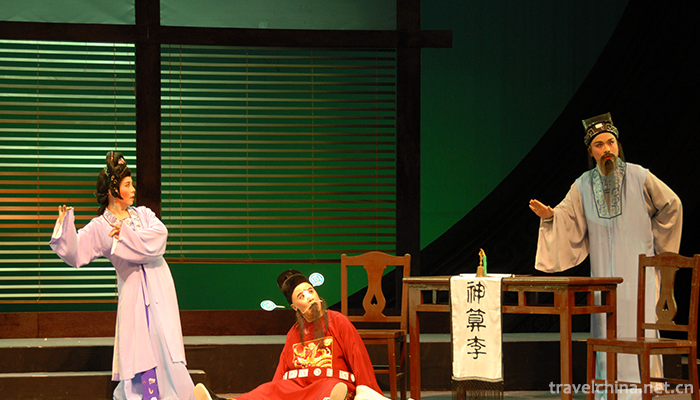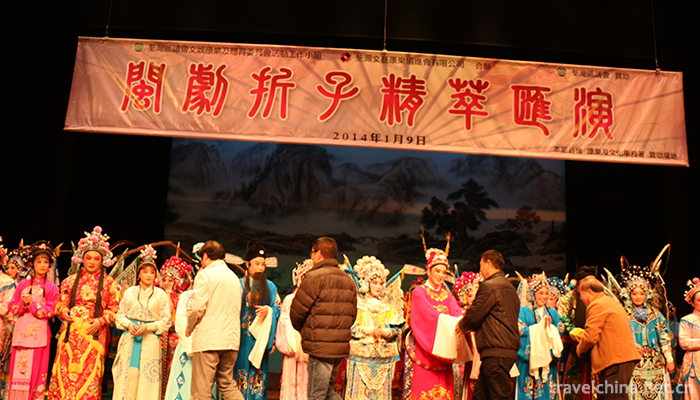Min Opera Fujian Opera
Fujian Opera, also known as Fuzhou Opera, is one of the national intangible cultural heritage.
Fujian Opera is the only existing opera that sings and reads Bai in Fuzhou dialect. It is prevalent in central Fujian, Eastern Fujian and Northern Fujian, and spread to Taiwan and Southeast Asia. It is composed of Confucian opera in the late Ming Dynasty and Pinghu opera and Jianghu opera in the early Qing Dynasty. It is a multi-tone opera in the late Qing Dynasty (from Guangxu to Xuantong). It is commonly known as "the first three symphonies". It is also known as "Banyan opera" or "Min opera". Fujian Opera has elegant style, handsome style, clear Tao Bai, graceful singing voice and smooth turning. Actors attach great importance to the basic formula of using hands, eyes, body, methods and steps in their performances, and strive to show graceful body and embody the inner world of the characters through their appearance.
On May 20, 2006, Fujian Opera was approved by the State Council of the People's Republic of China to be included in the first batch of national intangible cultural heritage catalogues with the number IV-45.
historical origin
The earliest predecessor of Fujian Opera was Cao Xueyu, a native of Hongtang Township in the western suburb of Fuzhou, who founded Cao Jiaban (later known as "Confucian Class") to create a new tune "teasing tune".
In 1604, Cao Fu's "Cao Jiaban" participated in the Pudu performance of Jinshan Temple in Hongtang Township, which was called "the first generation of Confucian forest". Before and after Cao Xueyu set up the "Confucian Class", there were also "Jianghu Class" and "Peace Class" among the people in Fuzhou. There are two kinds of class clubs. Singing is popular in the folk "river and lake", "foreign songs", "minor" and other tunes.
In the first year of Guangxu (1875), Confucian classes developed from rural areas to towns. In Fuzhou, there appeared classes such as "Liang Fayin" and "Drunken Spring Garden", which were collectively called "Thirteen Confucian Classes".
During the period from the end of Guangxu to Xuantong (1908-1911), Confucian opera, Jianghu opera and Pinghuo opera merged into one, commonly known as the "Three-in-one Sound", forming the rudiment of today's Fujian opera. After the Revolution of 1911, Fujian Opera entered a period of prosperity. Fujian Opera appeared successively such classes as "Old Sailor", "New Sailor", "Three Sailor", "Good Legend", "Sailing Natural", "Qingle Ran" (commonly known as "Three Music", "One Banner (Qi) and"Two Sheep (Ran)"and"Sailonggong","Qunfang"and other female classes in Fuzhou. Among them, "Qingle Ran" is the most important. These Fujian Banks have the largest organization, the strongest cast, the largest repertoire and the best reputation.
At the end of the Qing Dynasty, He Bi, a Fuqing native, exchanged with Cao Xueyu, the founder of Fuzhou's "Confucian Opera", and co-wrote scripts with him. He introduced the "Confucian Class" to Fuqing, and absorbed foreign voices such as Kun Opera and Beijing Opera to form local operas sung in Fuzhou dialect. Because of the performance on the ground surrounded by straw rope, it is called "underground flat" and "straw rope".
After the Revolution of 1911, Fujian Opera entered a flourishing period, and there emerged many classes and "four famous figures" such as Zheng Yiqu, Zeng Yuanfan, Xue Liangfan and Ma Difan, known as "Mei Lanfang of Fujian Opera".
In the 1920s, the stage setting of Fujian Opera changed. The three brothers Yu Hongguan and He Yiyun, He Xinru and He Mengyun made hard-film scenes of mountains, rocks, houses and walls on paper-mounted bamboo frames, as well as the so-called "ordinary curtain" composed of painting background and hard-film scenes, i.e. palaces, halls, flower halls, halls, nunneries, bedrooms, temples, funeraments, outdoors and gardens. Fourteen screen backgrounds, such as streets, prisons and poor families, and hard film scenes, such as stone bridges, waterfalls, towers, waterscapes, fires, barracks, rocks and villages, are combined according to the needs of the plot.
In the 1930s, Fuqing Fujian Opera in its heyday was composed of ritual wooden classes and mushroom tree classes. Anbang Ban, Dongyue Dian Ban, Liu Mei Ban, Zhenqu Ban, Zhonghou Ban, Ximen Ban, Yuxi Ban, Shattered Bowl Ban and other theatrical troupes are active in urban and rural areas.
During the Anti-Japanese War, Fuzhou was occupied, and artists such as Zheng Yicai, Yu Honghui and Chen Zhaohui fled to Fuqing. After the victory of the War of Resistance Against Japan, the theatre troupes competed with each other and recruited many famous actors from Fuzhou at great expense. Fuzhou Fujian Opera troupes and troupes often come to Fuqing to perform, which has left a deep impression on the audience, and laid a foundation for improving Fuqing Fujian Opera performing arts. At that time, there were more than 10 opera troupes, such as Gangtou, Ximen, Xiaoqiao, Wuyu and Yaqu.
In the 1950s and 1960s, Fujian Opera entered the second peak in history, creating and adapting a number of excellent plays. In 1951, under the convening of the government, the Fuqing Peace Fujian Opera Troupe was established as a public-owned organization and later named Fuqing Fujian Opera Troupe.
Following the Third Plenary Session of the Eleventh Central Committee, the Fuqing Folk Professional Theatre Troupe gradually developed and expanded. "Threshold Dao Mark", "Soul Broken Yanshan", "Baling Wound Farewell", "Dragon and Phoenix Golden Ear Pick" and other long performances. Fuqing Folk Opera Troupe has a maximum of 100 troupes.
In the 1980s and 1990s, Fujian Opera entered a new period, and new productions emerged.
Inheritance and protection
Inheritance value
Fujian Opera is the only existing opera that sings and reads Bai in Fuzhou dialect. It is an important link that can not be ignored in the study of the rheological history of opera tune and the development history of Fuzhou local culture.
Fujian Opera, with its profound historical and cultural accumulation and connotation, is the precious spiritual wealth of Fujian culture, the living fossil of Fuzhou dialect, an important artistic media for the transmission of vernacular, vernacular and vernacular feelings, and has high artistic value.
Inheritance status
The excavation, rescue and research of the heritage of Fujian Opera are limited by the shortage of funds, especially the creation of famous and old artists of Fujian Opera in various periods. Performance. Music, precious artistic historical materials, images, records, as well as a number of classical operas and famous songs that are on the verge of being lost have not been retained, and the talent drain. The serious talent gap has brought immeasurable losses to Fujian Opera. If it is not protected now, then Fujian Opera is in danger of extinction. Therefore, rescuing and protecting Fujian Opera is imminent.
Inheriting characters
Chen Xinguo, male, born in September 1946, is the representative inheritor of the third batch of national intangible cultural heritage projects of Fujian Opera, which was declared by Fuzhou City, Fujian Province.
Lin Peixin, male, born on April 21, 1951, is the representative successor of Fujian Opera in the second batch of state-level intangible cultural heritage projects, declared by Fuzhou City, Fujian Province.
Chen Naichun, male, born in November 1952, is the representative successor of Fujian Opera in the third batch of state-level intangible cultural heritage projects, declared by Fuzhou City, Fujian Province.
Lin Ying, female, Han nationality, born in 1950, Fujian Fuzhou, national first-class actor, president of Fujian Provincial Experimental Fujian Theatre, representative successor of the second batch of national intangible cultural heritage projects of Fujian Opera, Fujian Fuzhou declared.
protective measures
In 1989, Fuqing Wenlian Fujian Opera Troupe was founded, which contributed to the inheritance and protection of Fujian Opera.
In 1994, Fuqing Yihua Fujian Opera Troupe was founded, and more than 30 plays such as Yuanshuizhai, Tielingguan, and Yingqianqiu were created. The troupe adopted new talents, and the artistic level of the team's elite was constantly improved, making great contributions to the inheritance and protection of Fujian Opera.
social influence
Important performances
In 1951, Fuqing Fujian Opera Troupe premiered Tangdi Flower successfully.
In 1986, at the invitation of Singapore National Theatre Trust, Fuqing Min Opera Troupe arrived in Singapore to perform.
In 1999, Fuqing Wendeng Fujian Opera Troupe participated in the 21st Fujian Drama Conference.
In 2000, Fuqing Wendeng Fujian Opera Troupe participated in the Fifth China Yingshan Red Folk Art Festival.
In 2006, Fuqing Wendeng Fujian Opera Troupe participated in the 23rd Fujian Drama Conference.
In 2010, Fuqing Yishi Fujian Opera Troupe participated in the 20th anniversary of the founding of the city.
Honorary recognition
In 1956, Fuqing Fujian Opera Troupe's repertoire "Refining Seal" participated in the East China performance and won the first prize.
In 1983, Fujian Opera "Soul Broken Yanshan" won the second "National Excellent Screenplay Award".
In 1999, Fuqing Wendeng Fujian Opera Troupe participated in the 21st Fujian Drama Conference, and Baling Hurt Farewell won the "Drama Award".
On May 21, 2005, Fuqing Wenlian Fujian Opera Troupe was jointly awarded the title of "Ten Best Folk Professional Theatre Troupes" by the Provincial Culture Department, the Provincial Federation of Trade Unions and the League Provincial Committee.
In 2006, Fuqing Yuyu Fujian Opera Troupe and Yixue Fujian Opera Troupe were named the Top Ten Fujian Opera Troupe by Fuzhou Cultural Bureau.
In December 2018, the Ministry of Culture named Fuqing as "the hometown of Fujian Opera art in China".


0 Questions
Ask a Question
Your email address will not be published.